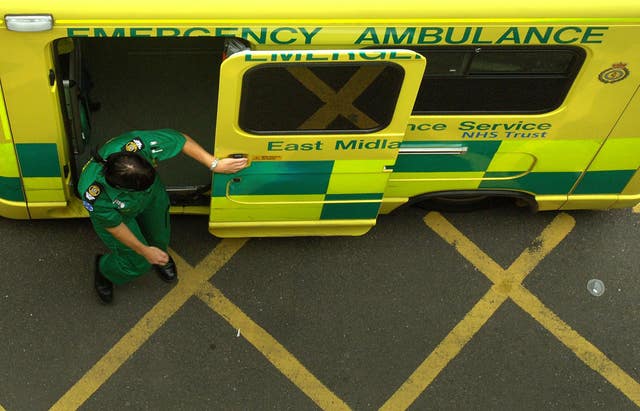
The Welsh Ambulance Service Trust (WAST) has been told it could be facing £15 million worth of cuts next year after receiving its draft budget.
Ambulance workers in Wales have been striking over pay and conditions since last year, claiming the current situation is hitting staff numbers, increasing delays and killing patients.
Around 1,500 Unison ambulance staff across the nation took part in a walk-out on Monday, with more industrial action planned next month.
Please help us protect the resources for those whose lives are in danger.
If it’s not life-threatening, some patients might be asked to make an alternative arrangement, such as making their own way to hospital. pic.twitter.com/RE98Rf9LyC
— Welsh Ambulance (@WelshAmbulance) January 23, 2023
A union boss told the PA news agency the service is already “on its knees” and that more cuts would be “catastrophic”, adding that there are concerns that redundancies and leaving vacancies unfilled will be a part of the cost-saving measures introduced.
The WAST confirmed the current £15 million hole in next year’s finances but said negotiations were ongoing to reduce the potential deficit.
Finance director Chris Turley has insisted that redundancies are off the table, whatever the final shortfall is.
The Welsh Government, which funds the NHS in Wales, blamed Westminster for providing an “inadequate settlement” due to “its mismanagement of the UK economy”.

A UK Government spokesperson said the Welsh Government “are well-funded to deliver on their responsibilities”.
“Health boards and trusts across the UK have now received their budgets for the year 2023/24 and they have not been increased in line with inflation, so that means the budgets are immediately in deficit,” the union boss said.
“So they’re all being told they’ve got to make millions of pounds’ worth of efficiency savings.
“The largest expense for most boards and trusts is wages so it’s the most likely place they will look to make cutbacks, and this might be done through not hiring people for the vacancies they currently have,” he claimed.
“Once again, reducing the levels of staff which we’re already saying is at dangerous levels.
“The service is already on its knees, there’s almost nothing left to cut, so any more cutbacks could be catastrophic.”
The cost pressures facing the service include inflation, energy and petrol prices, as well as the cost of around £6 million of keeping on 100 recently hired frontline workers which was paid for this year by non-recurring Welsh Government funding.

Mr Turley said: “As at this stage of developing our financial plan in previous years, our 2023-24 funding level is currently only a forecast based on a range of assumptions, which we are still in the process of agreeing, as are our cost estimates for the coming financial year.
“We are a commissioned service and continue to work with the Government and our commissioners to determine our final level of funding for next year, including the total quantum of any savings which may be required to balance and how they might be achieved.
“There is absolutely no suggestion that any shortfall in funding would result in redundancies and it’s wrong to suggest that it would.
“Our staff numbers have grown considerably in recent years to reflect the increased demand for our services and complexity of our patients.
“Retaining their skills is of paramount importance moving forward.”
He added: “While pressure on public service finances is acute, we will be doing everything we can to achieve a balanced budget, working with our trade union partners to ensure that we continue to run a safe and effective ambulance service.”
A paramedic, who asked to remain anonymous, said: “Unfortunately, I’m not shocked about the potential of more cuts coming our way.
“This is essentially why we’re striking.

“The public have been told it’s about below-inflation pay rises but it’s also a vehicle for us to explain more widely the problems that are going on, and that’s why a lot of us believe the Government is trying to stop our ability to speak out.
“We’re the canary in the coal mine raising the alarm because we’ve been putting up with this for so long watching the tsunami come closer knowing it’s only going to get worse until the whole system is redesigned and the social care side of things is fixed,” they added.
“We don’t need politicians pointing fingers at each other (at the) despatch box, we don’t need them to tell us how many millions more in funding they’ve given, because, while I’m sure that’s true, it’s obviously not working.
“We need an urgent plan, one that doesn’t involve pay cuts and budget cuts year after year – because where has that gotten us?”
A Welsh Government spokesperson said: “Due to the inadequate settlement provided by the UK Government and its mismanagement of the UK economy, our budget is worth £3 billion less in real terms than it was when it was originally set.
“Welsh ministers took tough decisions when making the Draft Budget 2023-24, including reprioritising funding across Government to refocus funding towards the NHS and other frontline public services.
“But there will still be pressures facing all health boards and trusts.”
The UK Government said: “Health is primarily a devolved matter for the Welsh Government, and they are well-funded to deliver on their responsibilities.
“We are providing them with a record £18 billion per year – which is increasing in real terms over the 2021 Spending Review period – and decisions taken at the Autumn Statement have topped up that funding further to help the Welsh Government with the pressures of inflation we are all facing.”


Comments: Our rules
We want our comments to be a lively and valuable part of our community - a place where readers can debate and engage with the most important local issues. The ability to comment on our stories is a privilege, not a right, however, and that privilege may be withdrawn if it is abused or misused.
Please report any comments that break our rules.
Read the rules here